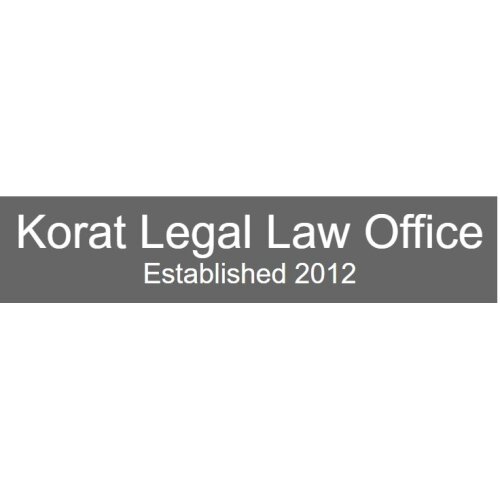Best Business Lawyers in Nakhon Ratchasima
Share your needs with us, get contacted by law firms.
Free. Takes 2 min.
List of the best lawyers in Nakhon Ratchasima, Thailand
Thailand Business Legal Questions answered by Lawyers
Browse our 13 legal questions about Business in Thailand and read the lawyer answers, or ask your own questions for free.
- What business categories are eligible for BOI promotion in Thailand?
- I run a manufacturing company which is registered in Thailand and we are interested in BOI promotion.
-
Lawyer answer
To gain BOI Thailand promotion, your business must fall within one of the eight stated business categories: Agriculture and agricultural products Light industry Services and public utility Chemicals, paper, and plastic Technology and innovation development Electronic industry and electric appliances...
Read full answer - What are the requirements for BOI promotion in Thailand?
-
Lawyer answer
There are details and nuances; however, at the basic level, your company is eligible for BOI promotion if it meets the following criteria: The company is included in one of the eight eligible business categories. The company performs eligible activities...
Read full answer - What benefits can my company enjoy under the Board of Investment (BOI) promotion?
- I am a tech business owner currently based in Europe, but looking to move operations to Asia, I would like to explore and compare options.
-
Lawyer answer
Once the company is BOI promoted, the following basic incentives may be granted: Exemption of corporate income tax Exemption of import duties on machinery Exemption of import duties on raw materials used in R&D Exemption of import duties on raw...
Read full answer
Thailand Business Legal Articles
Browse our 19 legal articles about Business in Thailand written by expert lawyers.
- The Penalties Of Not Filing Your Income Tax Return As A Foreigner In Thailand
- Thailand has strict tax regulations that apply to both residents and non-residents. In recent years, the Thai Revenue Department has updated its policies on how both foreign and locally sourced income are taxed.For foreigners earning income from either of these sources, understanding these requirements has become more important than ever.... Read more →
- Navigating the Legal Landscape of Digital Payments in Thailand
- The rise of digital payments in Thailand reflects the nation’s broader embrace of digital transformation and financial inclusion. From mobile wallets to QR code transactions, digital payment platforms have reshaped how individuals and businesses handle financial transactions. However, these developments also bring about a host of legal and regulatory challenges. ... Read more →
- Appreciating the Legal Aspects of Crowdfunding in Thailand
- With the power of relatively small donations from a lot of people, crowdfunding has become a great method for generating capital for startups, businesses, and even organizations to support their projects. The emergence of crowdsourcing sites in Thailand has matched world patterns and offers a vibrant channel for social influence... Read more →
About Business Law in Nakhon Ratchasima, Thailand
Nakhon Ratchasima, often referred to as Korat, is one of Thailand's largest provinces with a burgeoning business environment. As a rapidly developing area, it has attracted both local and international entrepreneurs. Business law in this region encompasses various legal practices, including company formation, trade regulations, labor laws, and taxation. Establishing a business in Nakhon Ratchasima can be fruitful due to its strategic location and expanding market opportunities. However, navigating the legal landscape requires a thorough understanding of local and national regulations.
Why You May Need a Lawyer
In the course of conducting business in Nakhon Ratchasima, there are numerous situations where legal assistance might be required. These include forming a new company, drafting and reviewing contracts, handling disputes with partners or employees, ensuring compliance with local and international trade regulations, and managing intellectual property issues. Lawyers can also assist with tax planning and resolving any legal conflicts that may arise with government bodies or competitors. Having professional legal support can help protect your business interests and ensure compliance with all relevant laws.
Local Laws Overview
The key aspects of local laws affecting business operations in Nakhon Ratchasima include company registration, which requires compliance with the regulations set by the Department of Business Development. Labor laws mandate specific employment practices and standards. Businesses must adhere to the Thai Revenue Code for taxation purposes. Additionally, understanding zoning laws, environmental regulations, and consumer protection laws is vital for certain business types. Foreign businesses must consider the Foreign Business Act, which restricts foreign ownership in certain sectors unless special permission is granted.
Frequently Asked Questions
What are the steps to register a business in Nakhon Ratchasima?
To register a business, you must submit an application to the Department of Business Development, including company name reservation, memorandum of association, and details of shareholders and directors. After approval, register for tax purposes and obtain necessary licenses.
Do I need a local partner to start a business?
For certain industries, particularly those restricted under the Foreign Business Act, foreign investors may require a local partner. However, sectors open to foreign investment do not necessitate a local partnership.
What types of business structures are available?
Common business structures in Thailand include sole proprietorships, partnerships, and limited companies. The most popular for foreign investors is the limited company due to its potential for limited liability.
How are business disputes resolved in Nakhon Ratchasima?
Business disputes can be resolved through negotiation, mediation, arbitration, or litigation. Thailand encourages out-of-court settlements, but court proceedings are an option if necessary.
What are the tax implications for businesses?
Thailand implements corporate income tax, value-added tax (VAT), and specific business taxes. It's crucial to understand and comply with these taxes to avoid penalties.
Can I repatriate profits from my business in Nakhon Ratchasima?
Yes, foreign business owners can repatriate profits after paying the applicable taxes. It's vital to maintain accurate financial records to facilitate this process.
What are the employment regulations I should be aware of?
You must comply with labor laws regarding minimum wage, employment contracts, working hours, and conditions. Employers should also address social security contributions and employees' welfare.
Are there any specific regulations for e-commerce businesses?
Yes, e-commerce businesses should comply with Thailand's Electronic Transactions Act and consumer protection laws. Data protection and privacy are also crucial considerations.
How do I handle intellectual property protection?
To protect intellectual property, you must register trademarks, patents, and copyrights with the Department of Intellectual Property. Legal assistance can ensure effective protection.
What should I know about consumer protection laws?
Businesses must ensure transparency in product information, fair pricing, and safe goods. The Consumer Protection Act outlines obligations and penalties for non-compliance.
Additional Resources
For further assistance, consider connecting with the following resources: the Nakhon Ratchasima Chamber of Commerce for networking and support, the Department of Business Development for registration guidance, and the Board of Investment for insights into investment laws and incentives. Engaging with local legal firms specializing in business law can provide tailored advice and representation.
Next Steps
If you require legal assistance, the first step is to consult with a business lawyer in Nakhon Ratchasima who understands both local and national laws. They can provide guidance specific to your business needs. Additionally, gathering all relevant business documentation and understanding your legal rights and obligations can better prepare you for consultations and legal proceedings. Developing a clear business plan with compliance in mind will also be beneficial moving forward.
Lawzana helps you find the best lawyers and law firms in Nakhon Ratchasima through a curated and pre-screened list of qualified legal professionals. Our platform offers rankings and detailed profiles of attorneys and law firms, allowing you to compare based on practice areas, including Business, experience, and client feedback.
Each profile includes a description of the firm's areas of practice, client reviews, team members and partners, year of establishment, spoken languages, office locations, contact information, social media presence, and any published articles or resources. Most firms on our platform speak English and are experienced in both local and international legal matters.
Get a quote from top-rated law firms in Nakhon Ratchasima, Thailand — quickly, securely, and without unnecessary hassle.
Disclaimer:
The information provided on this page is for general informational purposes only and does not constitute legal advice. While we strive to ensure the accuracy and relevance of the content, legal information may change over time, and interpretations of the law can vary. You should always consult with a qualified legal professional for advice specific to your situation.
We disclaim all liability for actions taken or not taken based on the content of this page. If you believe any information is incorrect or outdated, please contact us, and we will review and update it where appropriate.
Browse business law firms by service in Nakhon Ratchasima, Thailand
Nakhon Ratchasima, Thailand Attorneys in related practice areas.









